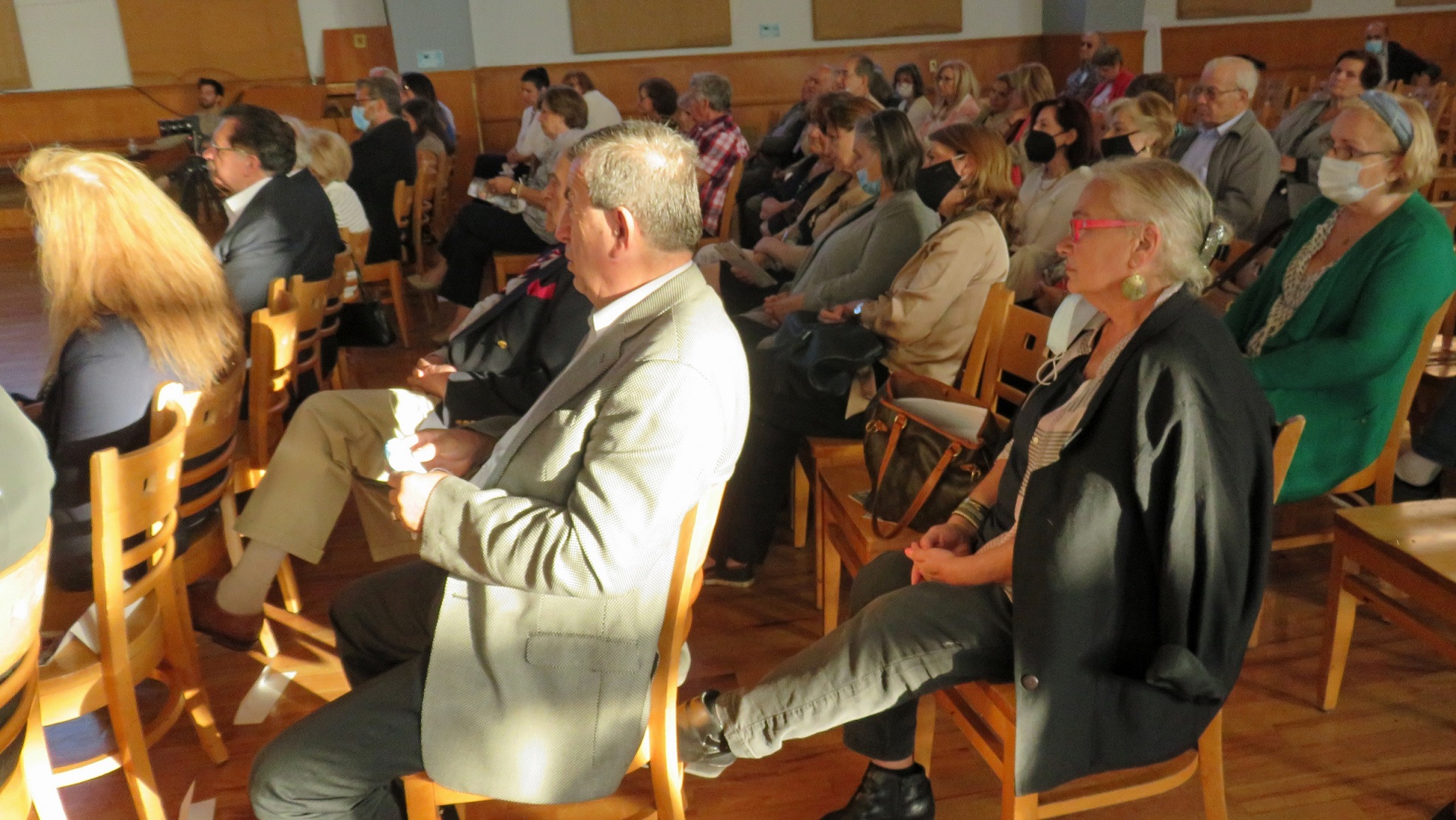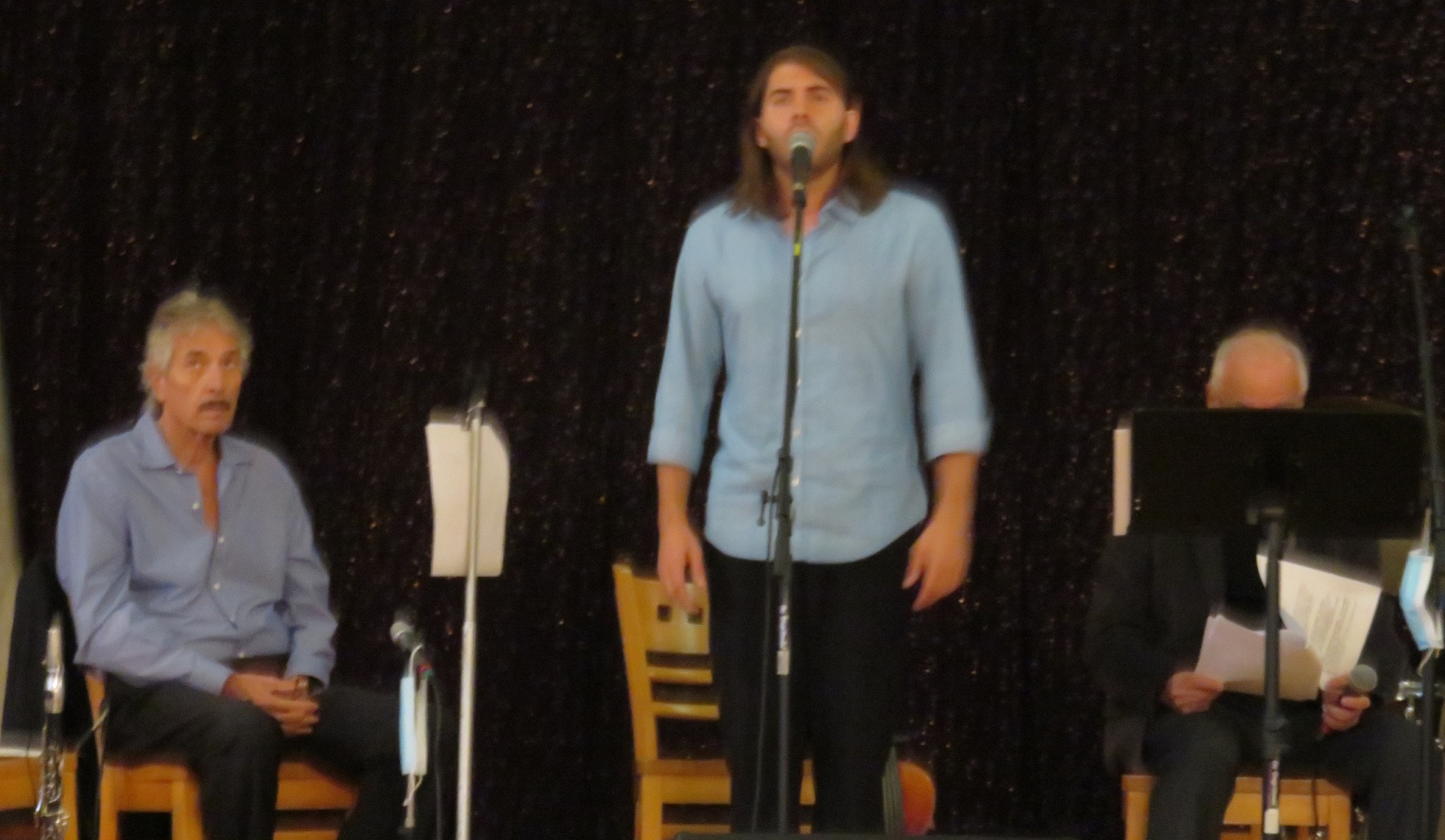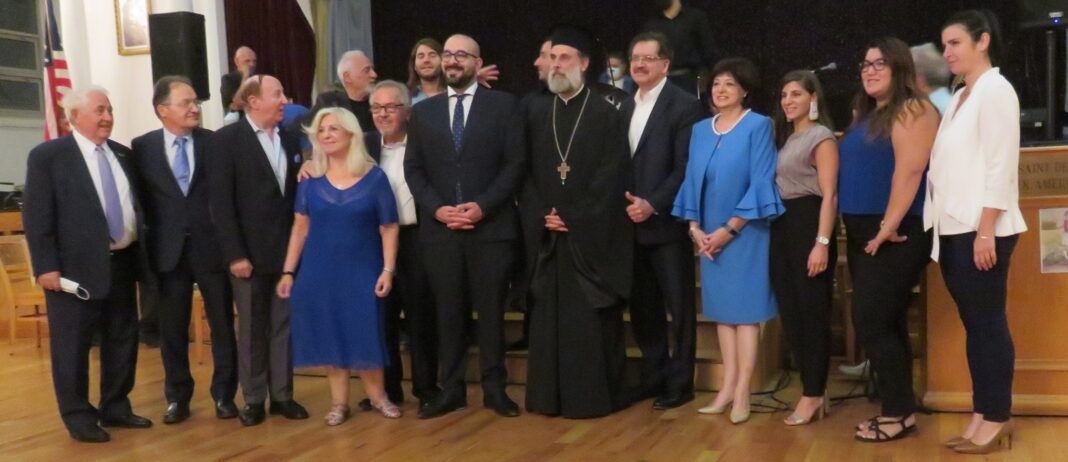“This is our major event that we are holding in person in the last two years,” said Demetrios Filios, second vice president of the “Geros tou Morea” NY chapter #1 of Pan Arcadian Federation of America. The culture event celebrated the 200th Anniversary of Greek Independence at St. Demetrios School in Astoria, New York, Sunday afternoon, September 26. Over one hundred persons attended. The culture committee chairperson was Angeliki Vournas. A program of historical readings and poems that were coordinated with the music of Grigori Maninakis’ band made this an exceptional program. Nikitas Tambakis, of Arcadian roots, was a vocalist with Prof. Grigori Maninakis band. Prominent persons included: Dean Archimandrite Nekarios Papazafiropoulos; Consul Dimitris Papageorgiou of the New York Hellenic General Consulate, Mr. Elias Katsos, Archon/Ahepa leader; Mrs. Stella Kokolis, President of the Federation of Greek American Educators and other prominent community and business leaders.
The program was a group effort that included planning during the year of the 200th Anniversary of Greek Independence. The persons in Geros tou Morea chapter #1 who contributed to this extraordinary celebration are the following: Executive Board,

Evagelia Lampropoulou Sarafoglou, President, Nikos Passias, 1sr Vice President, Demetrios A. Filios, 2nd Vice President, late Elena Catsimalis, poem speakers, Ageliki Vournas, Dimitrios Filios, Christos Vournas; 3rd Vice President, Christos Vounas, Treasurer; Culture Committee, Ageliki Vournas, President, Christos Vournas, Vice-President, Dimitrios Filios, Public Relations, Maria Mezari, program, Eleni Sarafoglou, Ioanna Catsimalis poem recitations, speakers, Ageliki Vounas, Christos Vournas, Dimitrios Filios; Welcome Committee George Kanelopoulos, John Tampakis and George Stavropoulos.
“I am happy to see Greek communities hold Hellenism alive,” said Greek Consul Papageorgiou. “The Greek community perpetuates their heritage. Greece in 2021 has a prominent world internationally. The Greek diaspora plays a significant role in Greece’s success.” The newly appointed consul, who is fluent in English and computer multimedia, with a down to earth personality, represents the new wave of Greek international diplomacy.
“My deep admiration and respect for General Theodore Kolokotronis and Arcadian heroes Nikitaras, D. Plapoutas, P. Kefalas, Ntounias and others,” said chapter President Evangelia Sarafoglou. “Many heroes were involved in the “Great Awakening. We must honor their memory. The Greek revolution was organized by Greek Diaspora communities. The Greeks overseas made independence possible. The world cannot exist without Greeks and their contribution to civilization.”

The event coincided with the successful Siege of Tripolis, capital of the Ottoman Empire in the Peloponnese on September 23, 1821. The strategic plan of Greek General Theodoros Kolokotronis, which aimed at the occupation of Tripolitsa, the administrative center of the Ottoman Morea ( Peloponnese), had almost prevailed. Greek camps were being set up around Tripolitsa. The aim was to cut off the city from the rest of the Peloponnese, making it easier to conquer. However, at the sight of the Turks, the recruited Greeks fled, without firing a single rifle. The result was that one after the other the camps were disbanded. Four hundred years of slavery and racism had made many Greeks bow their heads, when they saw a Turk, enduring his authoritarianism fatalistically. In Levidi, however, when it was heard that a Turkish army was arriving from Tripoli, no one left.
Meanwhile, reinforcements from the neighboring camps under Dimitrios Plapoutas, Elias Tsalafatinos, Nikolaos Petmezas, Stavros Dimitrakopoulos and Asimakis Skaltsas had begun to arrive. Then, the defenders came out of the houses and rushed against the Turks. They panicked and left the battlefield, leaving behind many dead. The victory of the Greeks in Levidi was the most important event of the Struggle until then. The Rayads (Greeks Chrisitans) now saw that the Turks were not invincible! This led to the successful siege of Tripolis.1
“The liberation of Tripolis was the turning point in the Greek Revolution,” said
. “Tripolis lies at the center of the Peloponnese. The city was an economic, social, and military center. The siege and subsequent surrender of Tripolis was the first major victory of the Greek forces under General Theodoros Kolokotronis. This triumph resulted in the formation of the Modern Greek state.”

“Theodore Kolokotronis was trained by the British military in Zakynthos,” explained Dr. Siolas. “He was elevated to the rank of general by the English forces. Brilliance, patriotism, a leader among men were his personal attributes. He was born in a small village outside of Kalamata. But his ancestry was from Arcadia, immortalized by Shelley’s poem ʽOde to a Grecian Urn’. The first towns to be freed from Turkish rule were mountainous Valtesi and Levithi in the Peloponnese. The Valtesian hero, Anagnostaras, a handsome, long-haired, mustached soldier with a sword has been immortalized. He was Theodoros Kolokotronis brother-in-law. He is shown in portraits as single-handedly fighting off hordes of the enemy. He was a valiant hero who inspired Kolokotronis troops.” Starvation took a death toll on the city’s civilian population. The Siegeʼs turning point was a negotiation with the defending Albanian forces. They cooperated with Kolokotronis in return for safe passage back to Albania. Albanian forces helped free the city from the Turkish defenders.” Turkey, a world power, departed from the Peloponnese and later Attica (prefecture surrounding Athens),” said Dr. Siolas. “They began departing from the Greek seas.ʼ2
The Turkish Coalition of America that fosters understanding of Turkish American issues through public education painted this portrait: This so-called Greek war of independence hitherto was hardly a war at all, but mostly a series of opportunist massacres against defenseless civilians, women and children who were slaughtered because of their ethnicity and religion (Muslim).
Prof. Alexander Colombos answered this article with sources that show these claims are false. “There are no photographs of those so-called massacres the Greeks did to the Turkish populations of Greece, which was very small and scattered all around the Peloponnese. There is not a single painting depicting those acts of Genocide! Those sources Turks refer to were anti-Greek diplomats and politicians and not real historians, who were anti-Greek and inspired by the movement of Orientalism.
They were nostalgic of the Ottoman Empire, which they have idealized in their fantasies as an exotic utopia oblivious of the harsh and savage reality of the Ottoman brutality and their mistreatment of Greek and other Christian populations. The numbers of the so-called massacred Turks vary to such a degree that it is crystal clear there is much confusion and inaccuracy due to the orientalist, anti-Greek propaganda and the exaggeration of some pro-Turkish pseudo historians….There are a number of scholars and professors in Greece who are funded with grants, research funds, and even salaries by NGOs and Turkish Universities, such as the Boğaziçi University and many others in order to promote historical revisionism and especially when it comes to the Greek War of Independence in 1821. Even Ministers of Greek Education from past governments and present governments follow this line thinking. This compromising stance may promote peace. However, the truth is there is much profit in such endeavors.”3
Ibrahim Pasha, an Islamized Greek from Macedonia, atrocities aroused horror in Europe and were to result in the end the Great Powers coming together to take joint action to save the Greeks. Ibrahim Pasha destroyed Mystra on September 14, 1824. Everything burnt. The British government sent Captain Hamilton “to intercept the Pasha and arrange a peaceable exchange of prisoners. When they found Ibrahim Pasha the next day (9/15/1824), he received them graciously, ‘but told them that though he regretted the necessity, he intended to burn and destroy the whole Morea. I will not cease,’ he repeated ‘till the Morea be a ruin.’”4 His aim was repopulation of Greece 200 years ago.
In 1825, Ibrahim’s forces marched through the Peloponnese to complete its devastation. In 1827, Britain, France, and Russia saved Greece for Greeks in the October 20th naval battle of Navarino. Ibrahim Pasha left the Peloponnese 10 months later in August 1828. The Greek guerrilla bands harassed his army, and in revenge, he desolated the country and sent thousands of the inhabitants into slavery in Egypt.4
The members of the Arcadian Federation of America are descendants of the people who fought and died in 1821, sold into slavery and experienced horrific genocide in every village. Each generation is told of the sacrifice of their ancestors who wanted to be free. They were granted this wish by the Phil-Hellenes in Europe and America, the great powers England, France and Russia who were horrified by the senseless killings of civilians by the Ottoman Empire leaders. 2021 Greece has the Arcadian/Greek overseas diaspora communities, young and old, of all classes, who remember their families’ sacrifice. They will fight for Greek sovereignty in 2021 as their ancestors did during the 1821 Greek revolution






